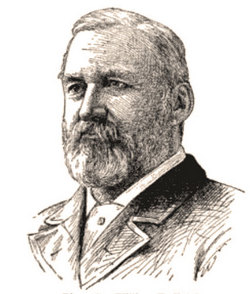An Agriculturist’s Legacy
A Confederate veteran became a United States Congressman and agriculture’s most ardent ally.
William Henry Hatch passed the bar in 1854 and moved from his native Kentucky to Hannibal, Missouri. There he practiced law, became a Democrat, and was elected a circuit attorney in 1858.
In the early days of the Civil War, Hatch was commissioned a captain by the Confederacy; in 1862, he was named assistant adjunt general. From March of 1863 until the end of the war, he served as assistant commissioner of prisoner exchange. Among other duties, Hatch was responsible for facilitating the flow of mail from families to prisoners, as indicated by the following excerpt from the March 1, 1864 Savannah Republican:
Leave the [personal] letter unsealed and enclose it in another sealed envelope, addressed to Captain William H. Hatch, Assistant Agent of Exchange, War Department, Richmond, Va., who will give it to the proper destination.
By February 1865, Hatch, now a Lieutenant Colonel, was busy overseeing the exchange of prisoners brought to South Carolina from camps deeper in the Confederacy.
Ironically, Hatch became a prisoner himself two months later when he, Colonel Robert Ould (his boss), and two other men unwittingly drove their wagon behind General Grant’s lines after escaping from Richmond. Because Lee had surrendered, virtually ending war in Northern Virginia, Hatch was paroled after an overnight sojourn in Libby prison, then being used by the Union.
Hatch returned to Missouri after the war and established a successful law practice that enabled him to pursue his great love: agriculture. He bought a farm south of Hannibal and took pleasure in breeding exceptional sheep and horses. In addition, he became active in politics and was eventually elected to eight consecutive terms in Congress beginning in 1879.
*****
The latter half of the nineteenth century saw American agriculture move from essentially subsistence farming to an industry. Settlers– many of them Civil War veterans– streamed into the young states of the Great Plains. Using an ever-growing variety of farm machinery, they grew bumper crops in rich prairie soil and fed herds of livestock. What they could not use themselves, they shipped to eastern markets via an expanding rail network.*

Representative William Henry Hatch chaired the House Committee on Agriculture for several years and worked tirelessly to improve the industry and its products to protect the safety of consumers.
As he represented a Midwestern state and was himself a farmer, Hatch quickly earned a reputation as a champion of agriculture. He chaired the House Agricultural Committee for several years. Herbert Underwood, in Volume 48 of American Agriculturist, said Hatch “is everywhere recognized as the foremost molder of agricultural legislation in the House of Representatives.”
Hatch’s efforts included issues such as the implementation of standards to control communicable diseases in livestock, the enactment of laws to control speculation in grain markets, and the establishment of the Bureau of Animal Husbandry. His work also led to the Oleomargerine Act of 1886 and the Meat Inspection Act of 1890, both of which enhanced consumer safety by providing for federal inspection of production facilities. Hatch was also a driving force behind elevating the Commissioner (now Secretary) of Agriculture to a cabinet position.
Sponsorship of the Hatch Act of 1887 proved to be the Congressman’s most far-reaching achievement. This act provided funds to the land-grant state colleges established twenty-five years earlier by the Morrill Act, colleges charged with including agriculture, home economics, and mechanical arts in their curricula. However, agriculture programs were neither well-staffed nor well-attended in the 1880s.
Funds from the Hatch Act were designated to establish experimental stations in all areas of agriculture, such as soils, plants, animals, production, distribution, and marketing. Information gained was to be distributed, at Federal expense, to concerned parties, from farmers to consumers.
A piece of landmark legislation, the Hatch Act helped put American agriculture on sound footing. The experiment stations it established enhanced the schools’ educational programs and drew high-quality faculty. Extension programs spawned by the Act brought useful information to millions of people. The Act’s– and Hatch’s– influence continues to be felt as research at the nation’s land-grant schools leads to improved animal and plant hybrids, cleaner air and water, and state-of-the art veterinary practices.
William Henry Hatch would be proud of what the legislation named for him accomplished– especially as one of those influential research stations is located on what was once his farm at Hannibal, Missouri.
_____
* For more about this subject, see the post “The Civil War Meant Business Unusual” under the Business tab.